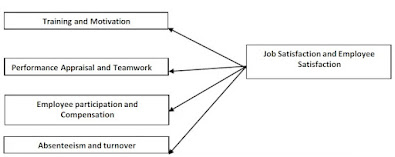Absenteeism in the Workplace
Absenteeism is define as employee is unable to present at work as scheduled regardless of the reason. Absenteeism is also referred as “Bottom-line Killer”, which could create negative vibes around the Organization.
 |
| Figure 1. Absent at work |
Impact on Absenteeism at Workplace
The impact of absenteeism can be very harmful for the
Organization as it will effect the bottom line of the Company.
As per Goodman & Robert, (1984)
following are listed as negative consequence of Absence.
|
Group |
Negative consequences of Absence |
|
Individual |
Loss of pay |
|
Co-workers |
Increased
workload |
|
Work-group |
Increased
coordination problems |
|
Organizational
Management |
Decreased
productivity |
|
Family |
Less earnings |
|
Society |
Loss of productivity |
There can positive outcomes as well of absenteeism but that
is very minimal. They are as follows;
·
Individual can take a break to release their
stress.
·
Company can test a new employee in the Role
·
Employee can be trained to multi-tasking
·
Some employees may receive overtime
But in contrast negative impact is much higher than the
positive outcomes.
Causes of Absenteeism
People miss work for a variety of reasons, many of which are
legitimate. Others generally are not. Some of the common causes of absenteeism
include, but are not limited to:
Burnout, stress, and low morale: due to Heavy
workloads, stressful meetings and/or presentations, and feelings of being
unappreciated.
Childcare and eldercare: When employees had to take care
of children and elders when normal arrangements have fallen through.
Depression: Depression could lead to take unexpected
leaves.
Disengagement: When employees are not motivated, tend
disengage with office environment.
Illness: Injuries, illness, and medical appointments
are the most commonly reported reasons for missing work—though not always the
actual reason.
Injuries: Accidents can occur on the job or outside
of work, resulting in absences. In addition to acute injuries, chronic injuries
such as back and neck problems are a common cause of absenteeism.
Job hunting: Employees may not inform that he will be
attending interview or recruitment agent, but they will fail to report to work.
Partial shifts: Arriving late, leaving early, and
taking longer breaks.
Conclusion:
There can be more consequences than discussed above. The
fact is that absenteeism is not related to individual decision but due to
surrounding as well. At times employee does not have any control over. A point
to note that Management too plays a major role to understand appreciate and let
the employees to feel belongingness.
References:
Folger, J., 2021. Investopedia.
[Online]
Available at: https://www.investopedia.com/articles/personal-finance/070513/causes-and-costs-absenteeism.asp
[Accessed 30 April 2022].
Robert, S. A. & Goodman, P. S., 1984. Effects
of Absenteeism on Individuals and Organizations. 1 ed. Pennsylvania:
Tepper School of Business.
Vulpen, E. V., 2016. https://www.aihr.com/. [Online]
Available at: https://www.aihr.com/blog/absenteeism/
[Accessed 30 04 2022].



As discussed, employee absenteeism can have a major impact on the performance of the organisation. HR managers play an important role in identifying the reasons for absenteeism and hep the employee in solving these issues. They also should keep employees motivated and engaged which will reduce absenteeism. Good article.
ReplyDeleteWorkplace harassment, family-related concerns, illness, and job hunting are all common reasons for absenteeism. Employers may incur higher expenditures as a result of absenteeism. You have clearly explained the impact and causes of Absenteeism in your article. Good Luck.
ReplyDeleteYou have clearly explained the causes and consequences of absenteeism. It is highly critical for an organization to make sure the employees are engaged towards the work they are assigned to reach the desired objectives. Good topic..
ReplyDeleteAbsence from work leads to less efficiency in organizational activities. When absence management is functioning properly, losses can be minimized. good article
ReplyDeleteAbsenteeism has more consequences than mentioned, its a good article on why and how it can impact on both corporate and individual levels. Great.
ReplyDeleteMethods used by an organization to reduce the absenteeism rates can be by building an desirable work culture and making the employees feel valued. As mentioned in the article, although there are some benefits in absenteeism, it largely has a negative impact on an organization. Great article.
ReplyDelete